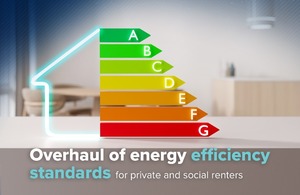Home upgrade revolution as renters set for warmer homes and cheaper bills
New plans to boost minimum energy efficiency standards for all rented homes.

- Over 1 million households to be lifted out of fuel poverty
- government confirms move to boost minimum energy efficiency standards for rental properties, bringing all homes up to a decent standard by 2030
Over 1 million households are set to be lifted out of fuel poverty, as the government announces plans for the biggest potential boost to home energy standards in history.
Families across the country are continuing to grapple with the consequences of high energy bills amid a cost-of-living crisis – with too many tenants exposed to a harsh daily reality of cold, draughty homes and expensive bills.
Government intervention is now well overdue to transform living standards and deliver the safety and security of warmer, cheaper homes that are free from damp and mould.
The Energy Secretary pledged to take action to reverse these failures of the past and stand with tenants, with a commitment to consult by the end of the year on boosting minimum energy efficiency standards for private and social rented homes by 2030.
Currently, private rented homes can be rented out if they meet Energy Performance Certificate E, while social rented homes have no minimum energy efficiency standard at all.
The government will now shortly consult on proposals for private and social rented homes to achieve Energy Performance Certificate C or equivalent by 2030.
The government has also announced a new Warm Homes: Local Grant to help low-income homeowners and private tenants with energy performance upgrades and cleaner heating, and confirmed the continuation of the Public Sector Decarbonisation Scheme, as well as the Warm Homes: Social Housing Fund, which replaces the Social Housing Decarbonisation Fund, to support social housing providers and tenants.
Today’s announcements kickstart delivery of the government’s Warm Homes Plan, which will transform homes across the country by making them cleaner and cheaper to run, from installing new insulation to rolling out solar and heat pumps.
Notes to editors
The number of tenant households in fuel poverty which are set to benefit from higher minimum energy efficiency standards is a preliminary estimate using the DESNZ National Buildings Model based on the assumptions from the government’s preferred position in the 2020 consultation on Improving the Energy Performance of Privately Rented Homes in England and Wales . The same assumptions were also applied to social housing to estimate the impact of new standards in the social rented sector. This includes assuming an energy efficiency target rating of C based on SAP2012 and the estimate refers to fuel poor households in England only. No account is taken of other future policies that might interact, such as the Warm Homes: Social Housing Fund. Fuller analysis will be set out in an Impact Assessment for the Regulations.
Guidance for Local Authorities on the new Warm Homes: Local Grant, which replaces the Local Authority Delivery scheme, and which will start delivery in 2025. The expression of interest window for local authorities wishing to participate will open in October this year. Low-income, private tenants will be eligible for support, with the agreement of their landlord. Private tenants are also eligible for support under the Energy Company Obligation. Further details of the Warm Homes Plan will be set out through the Spending Review.
Guidance for Wave 3 of the Warm Homes: Social Housing Fund, which opens for applications in week commencing 30 September.
Guidance for Phase 4 of the Public Sector Decarbonisation Scheme, which is delivered by Salix Finance.
We will shortly set out a consultation with proposals for improvements to Energy Performance Certificates to make them more accurate and reliable.